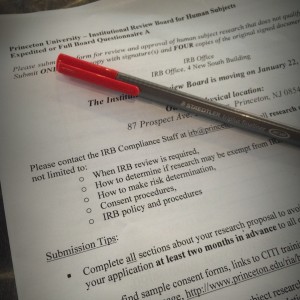 Ah, the Institutional Review Board. Set up to protect the rights of human subjects in research projects, it has an extremely integral role in upholding the standards of research ethics and morality. I’ll be the first to admit that the IRB application is nit-picky, especially for the low-risk research that most students will do. However, I then read about human experiments of years prior to the IRB’s establishment—like Tuskegee—and realize how truly important the IRB is and feel less like wanting to pull my hair out. If you don’t know what Tuskegee is, I suggest Googling it and you will have a new-found appreciation for the Institutional Review Board. You’ll finally understand exactly why the application is a gazillion pages long when all you’re really trying to do is send out an anonymous survey to a group of 35 kids. BUT, I digress.
Ah, the Institutional Review Board. Set up to protect the rights of human subjects in research projects, it has an extremely integral role in upholding the standards of research ethics and morality. I’ll be the first to admit that the IRB application is nit-picky, especially for the low-risk research that most students will do. However, I then read about human experiments of years prior to the IRB’s establishment—like Tuskegee—and realize how truly important the IRB is and feel less like wanting to pull my hair out. If you don’t know what Tuskegee is, I suggest Googling it and you will have a new-found appreciation for the Institutional Review Board. You’ll finally understand exactly why the application is a gazillion pages long when all you’re really trying to do is send out an anonymous survey to a group of 35 kids. BUT, I digress.
If your independent research involves humans as experimental subjects in any way, including interviews and surveys, you will have to fill out an application to get IRB approval. The purpose of the review board serves to make sure that all of your methods are ethical and do not pose harm to the people with whom you are working. It seems long and arduous, but I promise you’ll survive. When I filled out my first IRB application a few years ago, my adviser at the time send me a completed sample IRB questionnaire. It was very beneficial to have an example of the depth of specificity the answers had to be. That leads me to another tip—don’t be fearful of asking your adviser for help. He or she has been a part of assisting students with IRBs for years, so make use of his or her expertise. It is much easier to take the time to make a great first IRB submission, rather than have it get rejected upon first submission, and returned all marked-up in red with many corrections and revisions needed.
Last, but certainly not least, get this IRB done as soon as you possibly can. Getting approval is not a quick process and can take up to six weeks, or even more if there are amendments that have to be made after the board initially meets about your project. No work with human subjects can begin until official approval has been obtained. Get it completed so that you can start the fun part of your research!
The IRB isn’t scary—they want you to succeed in your research just as badly as you want to, but they also want to make sure everyone participating is protected in doing so. So, I know the questionnaire looks long and you have Blackboard posts to compose, term papers to write, and exams to study for. Just take a deep breath. Don’t pull your hair out. Sit down for a few hours, get it done. Ask for help when you need it. And just like that, everybody wins.
– Annie Woehling, Social Sciences Correspondent

